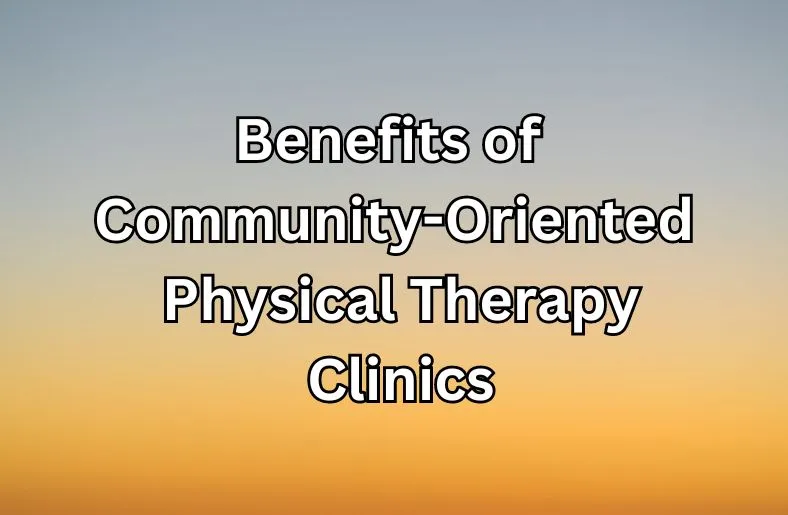Community-oriented physical therapy clinics excel in providing personalized care tailored to individual needs. This approach starkly contrasts the one-size-fits-all method often seen in larger institutions. Studies show customized treatment plans can significantly improve patient outcomes, dramatically enhancing healing.
Personalized care means therapy sessions are designed to fit individual needs, considering unique medical histories, lifestyle factors, and specific recovery goals. This attention to detail helps address current issues and prevent locations, making the treatment holistic and sustainable.
Key Takeaways
- Community-oriented physical therapy clinics offer personalized care.
- They foster solid patient-therapist relationships, improving treatment outcomes.
- Local clinics can contribute to overall community health and well-being.
Strong Patient-Therapist Relationships
Building strong relationships between patients and therapists is crucial for successful therapy. These bonds encourage open communication, making it easier for therapists to understand the causes of ailments and tailor treatment plans accordingly. In places like a Tennessee dispensary, personalized plans allow for a more focused and effective treatment.
According to Forbes, effective rapport-building techniques can improve therapy outcomes and higher patient satisfaction. When patients feel understood and supported, they’re more likely to adhere to their therapy regimens, attend sessions regularly, and actively participate in their recovery processes.
Moreover, these strong relationships can create a comfortable and trusting environment, which is essential for patients dealing with both physical and emotional pain. Over time, this professional bond transforms into a supportive partnership, guiding patients through their recovery journey.
Contribution to Community Well-being
Local physical therapy clinics significantly contribute to their communities’ health and well-being. By offering easily accessible services, they help reduce the incidence of chronic pain and mobility issues among residents. Community-focused health initiatives often lead to better public health outcomes and a heightened community spirit.
In areas like Tennessee, such clinics can become vital health pillars for the local population. These clinics often participate in community events, health fairs, and educational seminars to raise awareness about the importance of physical health and proactive wellness practices.
Additionally, by keeping community members healthy and mobile, these clinics contribute to a more active and engaged population, positively impacting everything from local sports participation to general public health metrics.
Flexible Scheduling and Accessibility
One of the distinct advantages of community-oriented clinics is their flexibility. Having the ability to provide more adaptable scheduling options to fit into the busy lives of their patients can make all the difference. This accessibility can significantly enhance patient commitment to therapy sessions, leading to better recovery rates.
Patients are more likely to attend regularly when sessions are convenient, improving overall treatment efficacy. Flexibility also extends to emergency appointments, where sudden injuries or flare-ups can be addressed promptly without long waiting times.
This immediate attention can significantly reduce the progression of an injury, speeding up recovery. Furthermore, these clinics often offer telehealth options, allowing patients to have consultations and follow-ups from the comfort of their homes, adding an extra layer of convenience and care.
Partnerships with Local Fitness Centers
Many community physical therapy clinics partner with local fitness centers to offer comprehensive care. This collaboration ensures that patients can maintain their fitness journey even after their therapy sessions end, promoting a holistic approach to health and well-being.
Such partnerships foster community engagement and bring convenience to patients who can attend therapy and fitness sessions nearby. By combining the expertise of physical therapists with the facilities and resources of fitness centers, patients receive a continuum of care that supports long-term health goals.
These partnerships often lead to the development of specialized fitness programs tailored for rehabilitation, bridging the gap between medical care and general fitness. Patients benefit from a seamless transition from recovery to maintaining a healthy lifestyle, ensuring that the progress made during therapy is not lost but rather built upon.
Continuing Education and Training
Community-based clinics often invest in the continuing education of their staff. This ensures therapists stay up-to-date with the latest techniques and treatment methods, providing the best care possible for their patients. Constant learning and development within the clinic enhance the quality of care and patient trust in the services provided. As a result, clinics can offer more innovative and effective treatments. Continuing education also means that therapists are well-versed in handling a variety of complex conditions and providing tailored treatments for unique cases.
Additionally, staying current with advancements in physical therapy enables clinics to adopt new technologies and methodologies, further refining their care. This commitment to professional growth benefits the therapists and the community, as patients receive cutting-edge care informed by the latest industry standards.
Peer Support and Group Therapy Options
Offering peer support and group therapy options is another hallmark of community-oriented clinics. These sessions allow patients to interact with others facing similar challenges, fostering a supportive environment.
Such settings can be incredibly beneficial for mental and emotional well-being, as patients gain encouragement from shared experiences and collective motivation. Group therapy sessions often include activities that promote social interaction, team-building exercises, and collaborative goal setting.
This collective approach helps in breaking the isolation that patients might feel, especially those dealing with long-term or chronic conditions. Furthermore, peer support networks extend beyond the therapy sessions, as patients often form lasting friendships and support groups that continue to provide emotional and motivational backing even after the formal therapy has concluded.
Real-Life Patient Testimonials
Hearing from real-life patients can be one of the most motivating aspects for new patients considering therapy. Community clinics often feature testimonials highlighting former patients’ successes and positive experiences.
These firsthand accounts validate the clinic’s efficacy and care quality, making it easier for new patients to commit to treatment. Testimonials often detail personal stories of recovery, highlighting the compassionate care therapists provide and the clinic’s supportive environment.
These stories resonate with potential patients, showcasing the real, tangible benefits of the clinic’s services. Additionally, testimonials can provide insights into the conditions treated and the individual progress journeys, offering new patients a clearer picture of what to expect and the potential outcomes of their therapy.





